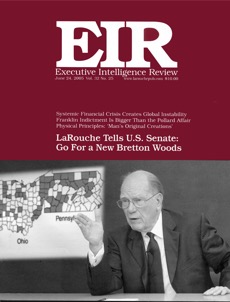Urgent Changes Needed in World Financial System
by Lyndon H. LaRouche, Jr.
Addressing a town meeting of the LaRouche PAC in Washington, D.C. on June 16, Lyndon H. LaRouche, Jr. underlined the essential role of the United States in saving the world from the onrushing financial-economic catastrophe. “We have made the most stupid mistakes imaginable during the past 30-odd years,” he said. “Recognizing that stupidity, which got us into all this mess, we should now decide we’re going to end it, and stop being stupid. And go back to being what we’re supposed to be: Being a United States, again. And being the United States to which the rest of the world looks up, as the one which they turn to for action, when they need somebody to step forward and take leadership, in providing the kind of action needed to save the world from Hell.”
International
Systemic Financial Crisis Creates Global Instability
by Nancy Spannaus
A swath of coup threats, destabilizations, and political hysteria is sweeping governments on all continents. This worldwide pattern is unprecedented in recent decades, and cannot be understood from the standpoint of the internal features of each nation. All of these crises are a reflection of the fact that the financial system is coming down, and that governments cannot deal with the crises they are facing.
Germany Struggles for New Economic Policy
by Rainer Apel
Why I Must Become Germany’s Chancellor
by Helga Zepp-LaRouche
No Real Conflict of Interests Between Israel and Iran
by Mary Burdman
A report from a seminar at the James Shasha Institute for International Seminars at the Hebrew University in Jerusalem.
Social Security Reorganization in Panama Is a ‘Death Plan’
by Carlos Wesley
The Banks Will Make Billions from This
Interview with Eduardo Ríos.
National
Franklin Indictment: Bigger than the Pollard Affair
by Jeffrey Steinberg
Leading Pentagon officials, now under suspicion in the Lawrence Franklin affair, go back to the Jonathan Pollard spy case as suspected members of the “X Committee,” the group of national security hawks who were under investigation as co-conspirators of Pollard, but were never prosecuted.
Documentation: Excerpts from the indictment of Lawrence Franklin.
The U.S. Intelligence Search for ‘Mr. X’
by Joseph Brewda
Reprinted from EIR, June 3, 1988.
Huntington’s Synarchist Scenario Escalates on U.S.-Mexican Border
by William F. Wertz, Jr. and Benjamin Castro
Portsmouth Closure Would End 300 Years of Shipbuilding
by Marsha Freeman
Documentation: The Maine State Legislature’s Resolution rejecting base closings.
City Councils Say: Save Auto Industry!
Congressional Closeup
by Carl Osgood
Science & Technology
How To Build 6,000 Nuclear Plants by 2050
by James Muckerheide
Nuclear engineer James Muckerheide tells how many nuclear plants would be needed to bring the world’s population up to a decent standard of living, and how to get the job done.
Physical Principles
Man’s Original Creations
by Lyndon H. LaRouche, Jr.
“At a time when many in the U.S.A. and elsewhere are inclined to accept my assessments and proposals as important,” he writes, “they tend, nonetheless, to worry all the more; they fear, that in their accepting what they now tend to admire in my work, they might tend to overlook my possible errors on related other accounts. I am therefore obliged to attempt, once again, to make the entirety of my methods and world-outlook transparent to those increased numbers of influentials and others who consider it important to know the fuller implications of my outlook, beyond what is expressed as explicitly on the subject of economy.”
Interview
Eduardo Ríos
A Panamanian lawyer, author, and former trade union leader, Ríos was one of the signers of the founding declaration of the Schiller Institute, and a founding member of the Schiller Institute Trade Union Commission.
Editorial
‘Mr. Bubble’ Greenspan
Correction
In our issue of June 10, p. 16, we misidentified one of the signers of Helga Zepp-LaRouche’s call for a New Bretton Woods system. Asger Baunsbak-Jensen is the former, not current, chairman of the Social-Liberal Party of Denmark.



